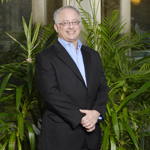Dave Weaving stood in front of a crowd of Realogy Holdings Corporation employees, holding in his hands a list of the year’s 10 most expensive medical conditions experienced by the audience and their colleagues. A year earlier, in 2010, breast cancer and heart attacks had been the leading toll-takers on the health of Realogy’s employees—and the self-insured company’s budget. This time, as Weaving made his way through the list, excitement grew, and, when he finished without mentioning either of the conditions, the crowd broke out in an unprompted ovation.
As executive vice president and chief administrative officer for Realogy, Weaving has had the pleasure, and sometimes the pain, of addressing that same audience many times before. As a global real-estate company whose subsidiaries include leading brands such as Better Homes and Gardens Real Estate, CENTURY 21, Coldwell Banker, Coldwell Banker Commercial, The Corcoran Group, ERA, Sotheby’s International Realty, NRT, Title Resource Group, and Cartus, Realogy is a true success story in 2013.
Given that the real-estate industry went into a downturn in 2006 that lasted two years longer than the recession that rocked the US economy from 2007 to 2009, Realogy’s survival was not achieved without a plan. For the company’s senior management team, that plan had to be carefully crafted and sensitively introduced. It would include consolidation, to be sure, but as Weaving realized in front of that crowd in 2011, Realogy’s ability to execute on its plan would save the company and its people in more ways than one.
* * *
If Realogy’s only objective had been to get its workforce healthy, perhaps the company’s employees would have only felt the pain of sore muscles following a hard workout. As the story goes, however, the company needed to tighten its belt across departments and functions in ways that often seemed stringent compared to Realogy’s contemporaries.
Weaving says housing began showing symptoms of recession as early as 2006. Because of Realogy’s constant market reporting and analysis, the forecast was clear enough for the company’s leadership to enhance its focus on managing all costs, including benefits that had previously been taken for granted. Weaving used an analogy to illustrate the strategy. “You might throw overboard some things you’ll need in the new world,” he says, “but if the ship doesn’t get there, it doesn’t matter what was on it.” When Realogy made the difficult decision to cut its 401(k) matching program in early 2008, before the height of the recession, what made good business sense at headquarters was not as well received by the company’s employees.
In the case of the 401(k) match, as with recession-related reductions to head count and facilities, Realogy’s business strategy was developed out of prudence and with an understanding of the pressures facing the overall housing market; however, the company’s employees were taken aback when cuts were made to benefits. “The feedback we got was pretty negative,” Weaving says. “But it was an aha moment for us in terms of finding a better way to communicate with our employees.”

The solution the executive team implemented was one of over-communication and transparency. The team hosted regular company-wide town hall meetings in the form of webcasts, with unfiltered question-and-answer sessions broadcasted live from
Realogy’s New Jersey headquarters. Everyone from the CEO to the CFO addressed employees on market conditions and financial matters, including benefits, the company’s debt covenant, and the uncomfortable but necessary decisions that needed to be made if Realogy were to weather the recession. During the process, the company’s leadership stood front and center, answering every tough question. But, as Weaving explains, they also tried to impress that cuts did not have to be across-the-board. “We told our employees that if they could help us get our hands around health-care costs, we could bring back the 401(k) match,” he says.
To kick-start the effort, employees were asked to submit ideas to name the company’s new health-and-wellness campaign, with the winner receiving reimbursement for half of their medical premiums for the year. Even with such a generous offer, Weaving thought the leadership team might only receive a handful of submissions. Instead, 500 entries came in, some accompanied by original jingles, and a conference room was reserved to create a process to go through them.
The winning entry was iThrive, chosen because it inspired a sense of action. Paired with newsletters, videos, and weight-loss contests, the iThrive campaign proved such a success that the company’s medical costs were steadily reduced from annual increases in the low double digits, to an annual reduction in 2012. Furthermore, in early 2012, Realogy was able to reinstate its company match on employee 401(k) investments to 25 percent, and has since doubled that commitment.
What is perhaps more impressive, however, is that Realogy’s employees adopted the cultural shift to the point where they actively manage their medical benefits as engaged consumers. Not only are they helping reduce insurance costs for Realogy, but they are a visibly healthier workforce.
* * *
With its early action at the onset of the recession, it was only fitting that Realogy would remain committed to strategic growth during the heart of the downturn while others were retreating. In 2008, Realogy launched a new franchise system, Better Homes and Gardens Real Estate, and, in 2010, its relocation services subsidiary Cartus acquired Primacy Relocation, which helped expand the company’s global footprint.
That growth, accompanied by nearly $500 million in savings from strategic cost reductions, helped make Realogy attractive enough in October 2012 for investors to support it at $27 per share as the company completed a $1 billion initial public offering, the third-largest IPO of the year in the United States. The nights that Realogy executives spent poring over market reports and finding creative ways to manage costs paid off for the company. “We spent basically four straight years in a cost-cutting round,” Weaving says. “When the call came—and it came often—we were able respond. It became cultural. If we had just indiscriminately made changes, we could have exacerbated the strain already on the business.”
Weaving says that the success of Realogy’s IPO was validating for the company, but the executive team has been careful never to let themselves grow comfortable. Having gone through the process of trimming its budget, the company is now committed to keeping the weight off. “We’re not relaxing our policies,” Weaving says. “The plan is to maintain those savings, and I think we’ve already proven that we can do many things to make an impact on managing our cost structure without sacrificing quality or services for our employees.”
Another area in which the company has demonstrated its unwillingness to compromise is ethics. In each of the last two years, Realogy has been recognized by Ethisphere as one of the world’s most ethical companies. The distinction, supported by Realogy’s company-wide ethics training, is a point of pride for Weaving, who sees it as a testament to the good choices that have allowed the company to thrive.
“When you look at the way we had to reduce our workforce materially during the downturn, manage costs across the board, and remove a lot of items we previously thought were necessary, being recognized for the ethical way in which we conduct our business is quite a compliment indeed,” Weaving says. “And it’s a testament to our employees’ commitment to doing things the right way.”

